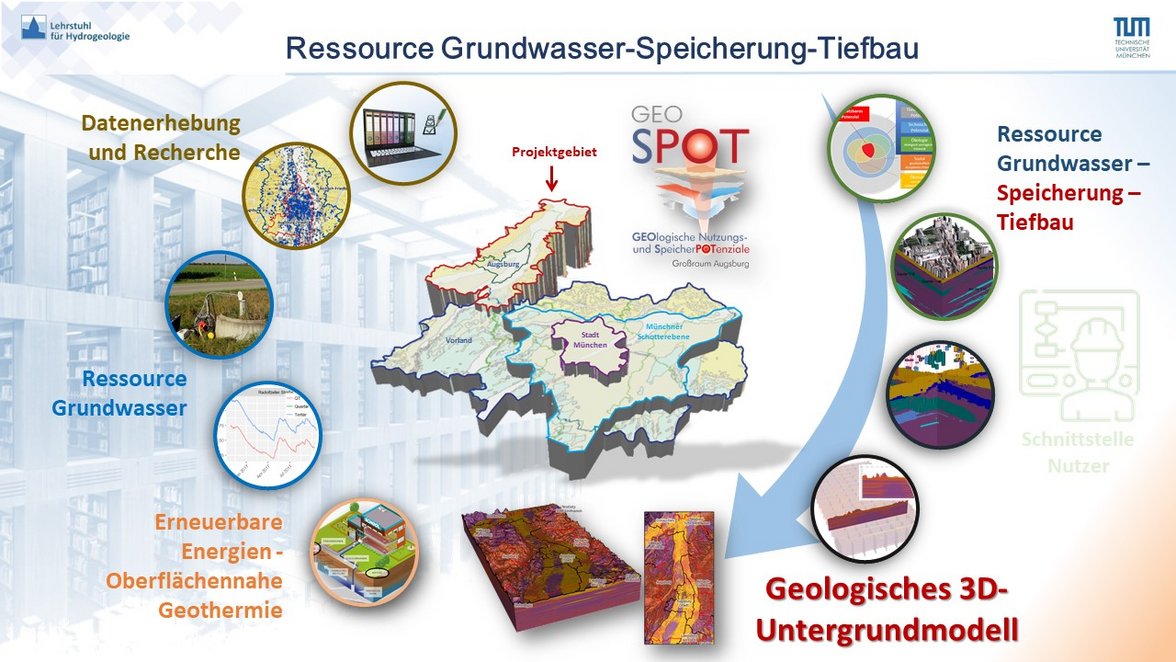Geologische Nutzungs- und Speicherpotenziale im quartären und tertiären Untergrund des Großraums Augsburg
The subsurface provides important natural resources and offers a wide range of storage possibilities (water, gas, CCS, heat). However, in order to make optimum and efficient use of the existing (geo)potentials and at the same time preserve the resources, primarily the groundwater, for future generations, sustainable and future-oriented spatial planning of the underground will be necessary. An optimal and efficient management of the geopotentials in the subsoil therefore requires on the one hand the area-wide survey of the geoscientific information basis, and on the other hand the detailed recording and delimitation of the geopotentials in the depth, consequently with a three-dimensional view. The “GeoSPOT” projects aims to determine the usable geopotentials, especially the relevant storage potentials exemplarily for an urban area in Bavaria as a pilot study. The wider area of Augsburg is chosen as the geological conditions and the already existing demand offer ideal conditions. The research goals include the first-time gathering and evaluation of comprehensive, three dimensional geological and hydrogeological data with focus on the usage of geo- and storage potentials. Especially the specification and parametrization of the potentials of the shallow geological layers in a 3D-model are key points. Furthermore, the enhancement of the 3D-geological lithofaciesmodel of Munich (GeoPot-project) for user-specific applications will be conducted. The “GeoSPOT Project” is financed by the “Bavarian State Ministry of Environment and Public Health (StMUV)”, supervised by the “Bavarian Environment Agency (LfU)” and realized by the “Chair of Hydrogeology - Technical University of Munich (TUM)” between 2020 and 2023.
Contributions to SDG
Responsible
Dr. Kai Zosseder; Dr. Lilian Chavez-Kus; M.Sc. Marco Kerl; Dipl.-Ing. Alberto Albarrán Ordás; Dr. Aleksandra Kiecak; M.Sc. Stefanie Küster; Dipl.-Ing. Tobias Schmetzer
Project duration
01.01.2020 - 31.12.2023
Funded by
Bavarian State Ministry of the Environment and Consumer Protection; Bavarian Environment Agency
Monographs and final reports
Report / Forschungsbericht: Schlussbericht zum Verbundprojekt GEO-KW: Kopplung des geothermischen Speicherpotenzials mit den wechselnden Anforderungen des urbanen Energiebedarfs zur effizienten Nutzung der regenerativen Energiequelle Grundwasser für die dezentrale Kälte- und Wärmebereitstellung in der Stadt. Schlussbericht - GEO-KW
Monograph - Geologica Bavarica Band 122: Die hydraulischen Grundwasserverhältnisse des quartären und des oberflächennahen tertiären Grundwasserleiters im Großraum München. https://www.bestellen.bayern.de/shoplink/91122.htm
Peer-reviewed papers in international journals
Albarrán-Ordás, A., Zosseder, K. (2023): Uncertainties in 3-D stochastic geological modeling of fictive grain size distributions in detrital systems. Applied Computing and Geosciences, Volume 19, article id. 100127. Special Issue on “Applications in 3D geoscience modeling”. https://doi.org/10.1016/j.acags.2023.100127
Zosseder, K., Pfrang, D., Schölderle, F., Bohnsack, D., Konrad, F. (2022): Characterisation of the upper Jurassic geothermal reservoir in the South German Molasse Basin as basis for a potential assessment to foster the geothermal installation development – Results from the joint research project Geothermal Alliance Bavaria. Geomechanics and Tunnelling 15, No. 1, pp. 17–24. https://doi.org/10.1002/geot.202100087
Albarrán-Ordás, A., Zosseder, K. (2022): The Di models method: geological 3-D modeling of detrital systems consisting of varying grain fractions to predict the relative lithological variability for a multipurpose usability. Bull Eng Geol Environ 81, 34 (2022). https://doi.org/10.1007/s10064-021-02538-2
Böttcher, F., Zosseder, K. (2022): Thermal influences on groundwater in urban environments – A multivariate statistical analysis of the subsurface heat island effect in Munich, Science of The Total Environment 810(4). https://doi.org/10.1016/j.scitotenv.2021.152193
Albarrán-Ordás, A., Zosseder, K. (2020): Geostatistische Reliefmodellierung der quartären Grundwasserleiterbasis in der Münchener Schotterebene unter Verwendung von Massendaten. German Journal of Geology. https://dx.doi.org/10.1127/zdgg/2020/0206
Abstracts & Conference papers
Albarrán-Ordás, A., Zosseder, K., Kiecak, A., Kerl, M., Chavez-Kus, L., Küster, S., Schmetzer, T. (2023): Optimierungsmöglichkeiten zur Festlegung der Bohrtiefenbegrenzung durch detaillierte geologische 3D-Modellierung und die Quantifizierung ihrer Auswirkungen auf die Nutzung des vorhandenen geothermischen Potenzials. DFG, 17.- 19.10.2023. Essen. Lecture and poster presentation, link to poster [here ]
Zosseder, K., Gossler, M., Böttcher, F., Pache, I. (2023): Entwicklung von Ein-Brunnen-Systemen zur Optimierung der thermischen Nutzung des Grundwassers am Beispiel Münchens. DFG, 17.- 19.10.2023. Essen.
Abarrán-Ordás, A. & Zosseder, K. (2023): 3-D stochastic geological modelling of the sediment texture in detrital systems prediction of fictive grain size distributions and uncertainty quantification. EGU 2023, 23.-28.4.2023, Vienna. https://meetingorganizer.copernicus.org/EGU23/EGU23-7556.html
Albarrán-Ordás, A. (2022): Das 3D-Untergrundmodell von München: Entwicklung eines nutzungsbezogenen geologischen 3D-Modells für das Untergrundmanagement der Stadt [The underground 3D model of Munich: Development of a user-related geological 3D model for the underground management]. Geoinformationssysteme 2022. Münchner GI-Runde. Runder Tisch GIS e.V. 28.03.2022.
Albarrán-Ordás, A. (2022): 3D-Modellierungsansatz zur Simulation der lithologischen Heterogenität von Lockergesteinssedimenten nach ihrer Korngrößenverteilung [A geological 3-D modeling method for simulating the lithological heterogeneity of unconsolidated soils after their grain size distribution]. GOCAD & 3D Anwendertreffen 2022. 09.03.2022.
Zosseder, K., Böttcher, F. (2021): Integration der thermischen Grundwassernutzung in die kommunale Strategie zur Wärme- und Kältebereitstellung am Beispiel München, Der Geothermiekongress DGK 2021, 30. Nov. -02. Dez. 2021, Essen, Germany.
Schramm, T., Böttcher, F., Pauw, V., Odersky, L., Halilovic, S., and Davis, K.: Geo.KW, a coupled hydrothermal and infrastructure model at urban scale, EGU General Assembly 2021, 19–30 Apr 2021, online.
Böttcher, F., Davis, K., Halilovic, S., Odersky, L., Pauw, V., Schramm, T., Zosseder, K. (2021): Optimising the thermal use of groundwater for a decentralized heating and cooling supply in the city of Munich, Germany. EGU General Assembly 2021, 19-30 Apr 2021, online.
Albarrán-Ordás, A. & Zosseder, K. (2020): La apuesta de la ciudad de Múnich (Alemania) por la geotermia somera y profunda para descarbonizar la ciudad [The role of shallow and deep geothermal energy in the decarbonization strategy of the city of Munich (Germany)]. Cluster of Efficient Energy in Catalonia (CEEC). Conference 06.11.2020.
Böttcher, F., Zosseder, K. (2020): Optimierung der thermischen Grundwassernutzung für die dezentrale Wärme- und Kältebereitstellung in München, Der Geothermiekongress DGK 2020, 09.-13. November 2020, Online







